Little Chef
Little Chef was a chain of restaurants in the United Kingdom, founded in 1958 by entrepreneur Sam Alper, who was inspired by American diners. The chain were famous for their "Olympic Breakfast" – its version of a full English – and "Jubilee Pancakes". The restaurants were mostly located on the roadside near A roads, often paired with a Travelodge motel and a petrol station, as well as on motorways in Moto Services.
 | |
| Private | |
| Industry | Roadside restaurant chain |
| Founded | 1958 |
| Founder | Sam Alper |
| Defunct | January 2018 |
| Headquarters | United Kingdom |
| Owner | Kout Food Group |
| Parent | Hybrid Dining Limited |
| Divisions | Happy Eater, Coffee Tempo! |
| Website | www |
The chain expanded rapidly throughout the 1970s, and its parent company would acquire the Happy Eater chain in the 1980s, its only major roadside competitor. When its owners converted all Happy Eater restaurants to Little Chef in the late 1990s, this allowed it to peak in scale with 439 restaurants.[1][2] Little Chef began to face decline in the early 2000s. This was mainly due to the chain expanding too fast, meaning it could not properly invest in all of its locations. The lack of investment tainted the brand image of Little Chef, making it appear outdated to consumers in the 2000s.[3] The chain was also facing increased competition as motorways had become favoured by motorists over A-roads for long-distance journeys.[4] Pubs had also become more child-friendly, and it became more common for them to serve food. Compared to its peak in the late 1990s, by 2005 the chain had lost almost half of its locations.[5]
In 2007, the chain entered administration, marking 41 out of 239 restaurants to close.[6] In 2012, the chain announced more closures to reduce the chain to 94 restaurants.[7] In early 2017, Kout Food Group sold most of the remaining 70 locations to Euro Garages for them to convert into their franchises such as Starbucks and Greggs, while other locations were sold to the McDonald's Corporation. [8] Euro Garages had planned to convert all Little Chef locations by the end of January 2018, though the project overran with 36 restaurants still awaiting conversion.[9] Due to trademark restrictions, all remaining Little Chef restaurants were renamed EG Diner by Euro Garages, and were either converted into other outlets, or closed by the end of October 2018.[10]
The defunct Little Chef brand is currently owned by Hybrid Dining Limited, a subsidiary of Kout Food Group.[11]
History
1958–1980
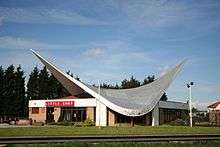
Caravan manufacturer Sam Alper built and designed the first Little Chef, modelled on diners he had seen in the United States.[2] Opened in 1958 on Oxford Road, Reading, it had just 11 seats.[2] The earliest Little Chefs were basic, prefabricated constructions, with room for up to 20 customers, a staff of three to four and provision for car parking.[12] Transport cafes of the period catered mostly to lorry drivers and bikers, but Alper wanted to serve the family market.[13]
Alper later sold portions of the company to catering industry veteran Peter Merchant, who developed the concept through his Merchant Group, which later merged with John Gardner Catering to form Gardner Merchant.[13] From 1965, the outlets began to be built in brick, with room for about 40 customers, by which time there were 12 outlets.[12] Standard décor and uniforms were brought in, together with staff training.[12] Later on, they were built with room for some 60 customers, car parking space was improved, and sign boards and other identifying marks emphasised.[12] In 1968, Gardner Merchant became a subsidiary of Trust Houses, by which time there were 25 Little Chef restaurants.[14]
In 1970 Trust Houses merged with Charles Forte's hotel and catering empire to become Trust House Forte; Europe's largest hotel, catering and leisure group.[12][15] By that time, Trust House Forte had 44 Little Chef restaurants.[12] The takeover by Forte gave Little Chef the capital and resources to expand rapidly. Frustrated by planning laws, Forte sent teams out to well-located transport cafes and offered the owners large cash incentives to sell and move out within the week so that Forte could turn their restaurants into Little Chefs.[16] Thus, by 1972 the chain had expanded to 100 outlets. Sites were a mixture of self-service and waitress service, though predominantly the former.[16] By 1976 there were 174 outlets, and the first "Little Chef Lodge" motel was opened.[14] In 1977, "Jubilee Pancakes" were added to the menu.[14]
1980–2000
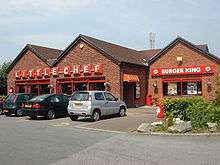
Little Chef outlets were opened at larger Trust House Forte service areas on motorways and trunk roads. In 1987 these service areas became known as Welcome Break after the acquisition of the smaller Welcome Break group of motorway service areas and the Happy Eater roadside restaurants,[15] Little Chef's main rival at the time, in 1986 as part of the break-up of Imperial Group. In 1990 the Little Chef Lodges were rebranded as Travelodge. In 1995 Forte announced the end of the Happy Eater brand, with all existing sites converted into Little Chef by 1997.[15]
Little Chef had a spin-off brand called "Little Chef Express" which Forte developed in 1995 as a rival to fast food outlets.[1] The first Express outlet was at the Markham Moor service station (A1 North), though only as an addition to the existing Little Chef menu there.[1] However, only five restaurants were ever built on the roadside, and the idea was re-developed when Little Chef was taken over by Compass, with the Express take outs being set up in food courts, including one in the Eurostar terminal.[1]
In 1996 the catering and broadcasting conglomerate Granada successfully mounted a hostile takeover for the Forte group.[15][17] Sam Alper sold his final stake in the company at this stage.[13] The Welcome Break chain was sold by Granada, the Little Chefs at those motorway service areas becoming a similar table service restaurant, Red Hen. High prices earned the chain the nickname "Little Thief".[18] In 1998, Granada bought AJ's Family Restaurants, another Little Chef rival, from the "Celebrated Group" and converted all of its fifteen sites to Little Chefs.[19] AJ's had originally been set up in 1986 by two Happy Eater directors, following Happy Eater's sale to Forte.[19]
2000–2007
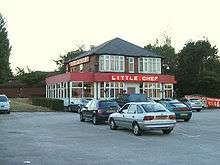
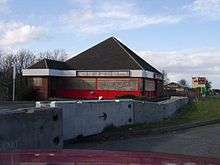
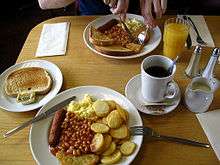
In 2000, Granada merged with the Compass Group to form Granada Compass, but the two demerged in 2001 leaving Little Chef as part of Compass.[20] At about this time some Little Chefs began serving Harry Ramsden's meals,[21][22] a cross-branding exercise by Compass who also owned Harry Ramsden's, though this ended in June 2004.[23]
The private equity business Permira bought Travelodge and Little Chef from Compass Group in December 2002 for £712 million,[24] forming a special purpose vehicle called TLLC Group Holdings.[25] Those Little Chefs at Moto motorway service areas – formerly the Granada motorway service areas, and owned[26] by Compass until 2006[20] – were owned by Moto and operated as franchised outlets.[1]
In August 2004, Little Chef announced it planned to change its logo, to a slimmer version of 'Fat Charlie', the chain's current mascot.[27] Little Chef's chief executive Tim Scoble said that this was " the start of a re-image programme for Little Chef" and that the chain "has become a little bit dated", but now wishes to "take it forward into the 21st century".[27] He also stated that: "We get accusations that he's overweight and a lot of people have also written in to say it was a small child carrying hot food, which they said was dangerous".[28] However, the idea was dropped after 15,000 customers complained.[28]
In 2005 the company was sold to catering entrepreneurs Lawrence Wosskow and Simon Heath[25] for £58 million.[29] TLLC kept hold of Travelodge,[30] and The People's Restaurant Group Ltd was founded by the new owners of Little Chef, however they continued trading under the same name.[31] In March 2006, the People's Restaurant Group sold 65 of its sites under a leaseback deal for £59 million[32][33] to Israeli property group Arazim.[34]
In December 2006, it was reported that Little Chef was undergoing serious financial problems; the business was said to be losing around £3m a year,[35] struggling to keep up with rent payments[35] and had lost nearly half of its branches in five years. Furthermore, Laurence Wosskow suffered a heart attack[36] and subsequent ill health earlier in the year, and was unable to help turn the company around.[35] On 21 December, Little Chef announced it were in urgent rescue talks with a group of American investors, in the attempt to secure rescue funding.[36][37] It had been suggested at the time that PricewaterhouseCoopers was on standby to act as administrators for the company; however a source close to the company was quoted as saying "We are still very hopeful that this situation can be resolved."[37] At the time, the People's Restaurant Group was being advised by KPMG's corporate recovery arm.[35][37]
In December 2006, Little Chef was taken into administration,[38] and the company was then rescued on 3 January 2007 by RCapital, a UK private equity group, which paid less than £10 million. 38 of the 235 branches were not included in the sale and were closed immediately;[39] the remaining restaurants continued to operate normally.
By December 2007 a number of sites not leased from Travelodge or Arazim (Little Chef's two main landlords) closed, as Little Chef had not been able to reach agreements with the individual landlords. As all the franchised outlets at Moto sites closed during 2008/2009, the chain was further reduced.
Several factors contributed to the decline of Little Chef, including increased competition from other chains and years of under-investment and neglect by numerous owners.
From its inception until the mid-1990s Little Chef had relatively little competition from other chains. However, by the early 2000s, the business was seen to be in decline, sometimes attributed to owners from Granada onwards having extracted too much money from the business without investing in updating the format. Britain's roadsides had become saturated by fast food restaurants such as McDonald's, KFC, and Burger King. Granada opened several Burger Kings within or adjacent to their Little Chef sites as a response, making Little Chef the largest Burger King franchise in the UK.
A further challenge to Little Chef was the rise of pub restaurants which catered both for the business and family markets. Recently refurbished service stations began to offer additional choices such as Marks & Spencer Simply Food and coffee chains such as Costa in place of Little Chef outlets, which appealed to people not wanting to spend a long time over a meal. Furthermore, the construction of the motorway network meant that A-roads (along which Little Chef outlets were usually situated) were no longer used for long-distance travel.
In 2005 it was announced that 130 underperforming restaurants were to be closed, reducing the chain to 234 restaurants. Prior to that however, Granada had been gradually reducing the number of restaurants, from well over 300 at one time. During 2005 Travelodge Hotels Ltd (the new name for TLLC) made various announcements about the sale of some or all of the restaurants, until in October the chain was sold to The People's Restaurant Group Ltd, who planned to modernise the restaurants and introduce self-service.
Changes introduced during 2006 included the opening of coffee shops under the name Coffee Tempo! within several larger branches. These 'grab and go' units were developed by Nick Smith, who joined Little Chef as development director after leading the design and implementation of the Wild Bean Café format at BP petrol stations. Little Chef also introduced a takeaway menu. Both initiatives were aimed to increase the appeal of the brand to customers unwilling to spend a long period waiting for table service.
The People's Restaurant group slashed menu prices in an attempt to attract customers. The only outcome of this was less money going through the tills. It would appear that Little Chef completely ignored the competition it was faced with, not to mention the fact that restaurants had become run down and staffed minimally.
2008–2016
In 2009, celebrity chef Heston Blumenthal appeared in a Channel 4 documentary programme to revamp the Little Chef chain; the programme was broadcast from 19 to 21 January,[40] and involved Blumenthal introducing a new menu and organising a refit at the Little Chef in the village of Popham, near Basingstoke. The trial was successful, with a promise from the owner that none of the dishes would change without Blumenthal's consent. Heston Blumenthal returned to Popham in February 2009 to review progress, and the owner promised that if there was a profit within three months the redesigned format would be spread to all branches. Furthermore, two more former Little Chef branches would reopen, in Ings and Malton. It was later announced that a further two Little Chefs, at York and Kettering, would be refurbished in the style of the trial in Popham.
In 2011, a further ten new concept restaurants opened at Doncaster, Markham Moor North, Shrewsbury, Black Cat, Fontwell, Weston on the Green North, Wisley South, Ilminster, Podimore and Amesbury with a view to investing £20 million in updating the brand across the estate.[41] New menus have been introduced and restaurants have been refurbished based on the style which Blumenthal designed in 2009. A full rebranding exercise was undertaken by Venture Three,[42] which was hailed as a great success by the graphic design community.[43] As part of its modernisation the company used its new branding to create a presence in the digital arena on Facebook[44] and Twitter.[45]
A 'Good to Go' deli offering was introduced in the new concept restaurants, making bespoke sandwiches as well as takeaway meals appealing to customers on the move. 'Good to Go' sits alongside the traditional sit-down Little Chef format.
In May 2011 the company reported a 47% increase in food sales.[46]
On 11 January 2012, Little Chef announced that it planned to close 67 of its failing restaurants, with the loss of up to 600 jobs.[47] On 7 February RCapital announced that it was putting the Little Chef chain through "a pre-pack administration to offload a number of toxic leases". Graham Sims, the chairman of Little Chef, said that suppliers and other unsecured creditors would suffer from the decision to put the chain through this administration process, which had been taken reluctantly. He expected job losses to be at the lower end of the previously announced range of 500 to 600. The business will refocus now on a core of 95 profitable sites.[48]
By January 2012, 11 Little Chefs had been converted to the Blumenthal format.[49]
In April 2012, the chairman Graham Sims said, "Everyone remembers Little Chef from the 1970s, with curtains at the windows and wooden tables. It worked well for 20 or 30 years but frankly it hasn't kept pace with the evolution of the retail market. It lost its way. We've gone through 3 or 4 owners in 10 years and none of them have really taken the tough decisions to sort out the assets, the cost base and bring up the offer for the 21st century."[50] In his view, some of the owners had treated it as "a cash cow, looking for the traditional quick in and out".[50] in September the company announced plans to franchise. In April 2013, R Capital announced that it was to seek a buyer for the Little Chef business which comprised 78 outlets, from Scotland to Cornwall, all of which are said to be profitable. The move indicated that R Capital had succeeded through tough restructuring in turning round the company's fortunes. The sale was expected to have a price tag of 'tens of millions of pounds'.[51]
In June 2013, Little Chef announced that it dropped Heston Blumenthal's creations from all its menus. Little Chef spokesman Richard Hillgrove is quoted as saying that 'Heston originally approached us to do his Channel 4 show about how he was going to save Little Chef. It seemed like a good idea at the time. But he took everything away from its core.' [52] In August 2013 R Capital sold Little Chef to Kout Food Group UK which started revamping the remaining restaurants and also putting Burger King back into some of the sites that had them before like Penrith and Ely. KFG have also been adding Subway to some branches. In 2014, Little Chef lost more restaurants including Dreghorn (January 2014), Royston (March 2014) and Whiddon Down (October 2014). Whiddon Down was one of the busiest Little Chefs in the southwest; they closed it and are now only operating out of a quieter location, Sourton Cross. The site at Whiddon Down is located next to a Travelodge and has been converted into a new roadside brand called Hog & Hedge. By 2014 around 14 restaurants had received full 'Wonderfully British' refurbishments.
Closure
In February 2017, Kout Food Group sold all Little Chef locations to Euro Garages, though with Kout retaining full rights to Little Chef's intellectual property and franchise control.[53] Euro Garages began a programme to close down all Little Chefs, replacing them with their other brands such as Starbucks and Greggs. Not long after this announcement, the number of Little Chefs dropped down to 66 outlets, due to the closure of under-performing sites such as Winterbourne Abbas, Axminster and Dolgellau. These restaurants would be converted into Greggs and Starbucks sites a few months after their closure. In July 2017, Euro Garages brought about the closure of two of the chain's prime locations: the Blumenthal-remodelled Popham and Barton Stacey.[54]
The closure process of Little Chef was scheduled to be complete before the end of 2017, but was postponed until early 2018 due to timing problems. Kout Food Group revoked Euro Garage's Little Chef franchise at the end of January 2018, causing Euro Garages to temporarily rename all Little Chef locations to EG Diner until they could be converted into partner brands.[55] The final EG Diners that were not rebranded closed in October of 2018.[56]
Fate
The defunct brand is currently owned by Hybrid Dining Limited, a subsidiary of Kout Food Group, who also own Happy Eater and Coffee Tempo! trademarks. Accounts filed by Hybrid Dining Limited show that there was interest in franchising the Little Chef brand in the future, though nothing has come of this thus far.[11]
Despite this, as of mid-2020, the Little Chef website remained operational, including the list of locations, all of which are now closed.[57]
Ownership
Little Chef has been owned by six different companies since its mid-1980s heyday. It was owned by Trusthouse Forte from the 1970s, who were taken over by Granada Hospitality, a division of Granada plc. then being 'spun out' into Compass, who themselves sold the chain to the private equity firm Permira. They subsequently divested the chain to The People's Restaurant Group, who in turn sold the chain to the business turnaround specialists RCapital. Planned and reactive investment in the fabric and infrastructure of the chain ended with the sale from Forte, which may explain why many of the interiors appear to date from this, early 1990s, era. In July 2013, RCapital sold Little Chef to the UK arm of Kuwaiti-owned Kout Food Group. In February 2017, Kout Food Group sold Little Chef units along with other roadside units to Euro Garages, though the Kuwaiti-based company retains the Little Chef name.[58]
International
Although Little Chef's main market was the UK, they have appeared in other countries. In the 1970s there were two in France, both of which closed by 1976. In 1992–3, two sites were opened in the Republic of Ireland with three more following between 1996–97 and 2001–02. In 2005, Little Chef and Travelodge in Ireland were sold off to new operators and the Little Chefs were rebranded. The two Dublin ones became "Metzo" restaurants and the three others became Eddie Rockets Diners. Little Chefs next foray was into Spain with three branches opened by 1994–95, but later closed.
See also
References
- "Little Chef". Motorway Services Online. Retrieved 15 February 2011.
- "A Little Bit About Us". Little Chef. Archived from the original on 7 January 2011. Retrieved 11 February 2011.
- "Portly Little Chef to slim down". 16 August 2004. Retrieved 16 August 2019.
- "PR Case Studies | Case Study Examples". Archived from the original on 25 January 2013. Retrieved 23 September 2012.
- "Little Chef - motorway services". Motorway Services Online. Retrieved 16 August 2019.
- "Lossmaking Little Chef restaurants are closed". The Caterer. 18 January 2017. Retrieved 27 April 2019.
- "Little Chef to close 67 outlets". 11 January 2012. Retrieved 27 April 2019.
- "Kout Food Group sells Little Chef sites to Euro Garages". The Caterer. 3 February 2017. Retrieved 27 April 2019.
- "EG Diner - motorway services". Motorway Services Online. Retrieved 27 April 2019.
- "Sourton Cross". Little Chef Wiki. Retrieved 27 April 2019.
- "Search for a trade mark - Intellectual Property Office". trademarks.ipo.gov.uk. Retrieved 12 March 2020.
- "Trusthouse Forte PLC" (PDF). Competition Commission (United Kingdom). 2007. Archived from the original (PDF) on 8 July 2011. Retrieved 12 February 2011.
- "As Little Chef faces being wiped from the map, lifelong devotee GUY ADAMS says... Oh how I'll miss those gut-busting brekkies". Daily Mail. London.
- About us : Little Chef Archived 9 March 2013 at the Wayback Machine
- "Little Chef – hospitality company profiles". catersearch.com. 17 August 2009. Retrieved 15 February 2011.
- "Little Chef - motorway services". Retrieved 4 February 2017.
- Hosking, Patrick (14 January 1996). "FORTE". The Independent. UK. Retrieved 12 February 2011.
- Duncan Angwin; Stephen Cummings; Chris Smith (12 December 2011). The Strategy Pathfinder: Core Concepts and Live Cases. John Wiley & Sons. p. 307. ISBN 978-1-119-99588-3.
- "AJ's". Motorway Services Online. Retrieved 20 February 2011.
- "Our history". Compass Group. Archived from the original on 17 October 2016. Retrieved 20 February 2011.
- "Harry Ramsden's Past and Present". Yorkshire: God's Own Country. 12 April 2009. Retrieved 20 February 2011.
- Boggan, Steve (14 December 2001). "Little Chef's special gives hopeless romantics a taste of true love". The Independent. UK. Retrieved 20 February 2011.
- "Little Chef drops Harry Ramsden's". catersearch.com. 5 July 2004. Retrieved 20 February 2011.
- "Permira agrees to pay Compass £712m for UK Travelodge and Little Chef". AltAssets. 18 December 2002. Archived from the original on 7 July 2011. Retrieved 10 March 2011.
- Costello, Miles (8 July 2005). "Catering entrepreneurs in '£50m' Little Chef buy". The Times. UK. Retrieved 10 March 2011.
- Mesure, Susie (29 June 2002). "Compass puts Little Chef sale on the menu". The Independent. UK. Retrieved 10 March 2011.
- "Portly Little Chef to slim down". BBC News. 16 August 2004. Retrieved 12 February 2011.
- "Little Chef drops slimmer logo after 15,000 complaints". Brandrepublic. 29 September 2004. Retrieved 12 February 2011.
- "City sandwich". The Daily Telegraph. UK. 21 October 2005. Retrieved 3 April 2011.
- Mesure, Susie (9 July 2005). "Fast-food entrepreneur to buy Little Chef". The Independent. UK. Retrieved 3 April 2011.
- "The People's Restaurant Group Ltd". Bloomberg BusinessWeek. Retrieved 3 April 2011.
- "Fladgate advises Arazim on Little Chef purchase". Fladgate. 12 January 2007. Retrieved 23 April 2011.
- Chesters, Laura (24 February 2006). "Israeli investor takes Little Chefs off menu". propertyweek.com. Retrieved 23 April 2011.
- Bill, Tom (2 March 2006). "Little Chef chain says goodbye to Fat Charlie". catersearch.com. Retrieved 23 April 2011.
- Pagnamenta, Robin (30 December 2006). "Little Chef chain seeks rescue in weekend talks". The Times. UK. Retrieved 16 April 2011.
- "Little Chef in survival bid". Edinburgh Evening News. 21 December 2006. Retrieved 16 April 2011.
- Siobhan Kennedy, Dominic Walsh (21 December 2006). "Little Chef in rescue talks with American investors". The Times. UK. Retrieved 23 April 2011.
- Wachman, Richard (24 December 2006). "Little Chef chain fights to stave off bankruptcy". The Guardian. UK. Retrieved 11 May 2010.
- Geoghegan, Tom (5 January 2007). "The road to recovery". BBC News. Retrieved 11 May 2010.
- Cockcroft, Lucy (27 March 2008). "Heston Blumenthal to transform Little Chef". The Daily Telegraph. UK. Retrieved 27 March 2008.
- "The Taste Revolution Continues..." Little Chef website. UK. 27 March 2008. Retrieved 21 July 2011.
- "Venture Three Re-Brand". Venture Three website. UK. Retrieved 21 July 2011.
- "The new Little Chef". Creative Review. UK. Archived from the original on 20 August 2011. Retrieved 21 July 2011.
- Little Chef Facebook, UK, retrieved 21 July 2011
- Little Chef Twitter, UK, retrieved 21 July 2011
- "Little Chef food sales up 47%". Eat Out Magazine. UK. Archived from the original on 2 October 2011. Retrieved 21 July 2011.
- "Little Chef to close 67 outlets costing around 500 jobs". BBC News. BBC. 11 January 2012. Retrieved 11 January 2012.
- The Times. "Little Chef owner's pre-pack solution". Times Newspapers Ltd. Retrieved 8 February 2012.
- Kelner, Simon (12 January 2012). "Simon Kelner: Olympic Breakfast may explain Little Chef's decline". The Independent. London.
- Wallop, Harry (29 April 2012). "Monday interview: Little Chef trims down for Olympic challenge". The Daily Telegraph. London.
- Lucas, Louise (14 April 2013). "Little Chef serves up a turnround story". Financial Times.
- Bryant, Ben (23 June 2013). "Little Chef drops Heston Blumenthal from menu". The Telegraph. London.
- Media, Insider. "Little Chef sites sold to Euro Garages". Insider Media Ltd. Retrieved 30 July 2020.
- "Popham - motorway services". Motorway Services Online. Retrieved 30 July 2020.
- "Little Chef: the end of the road for Britain's finest roadside cuisine?". The Daily Telegraph. 2 February 2018. Retrieved 2 February 2018.
- "EG Diner - motorway services". Motorway Services Online. Retrieved 30 July 2020.
- "Locations". Little Chef. Retrieved 11 August 2020.
- "Kout Food Group sells Little Chef sites to Euro Garages". The Caterer. 3 February 2017. Retrieved 4 February 2017.
External links
| Wikimedia Commons has media related to Little Chef. |